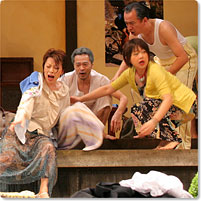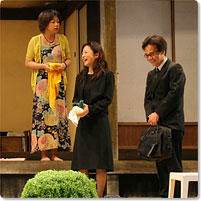
Data
:
Premiere: 2007
Length: 2 hr. 10 min.
Acts, scenes: One act, 5 scenes
Cast: 12 (8 men, 4 women)
Tsuma no Kazoku (My Wife’s Family)

Born in Tokyo in 1959, Satoshi Suzuki attended Waseda University, where he studied in the political science and economics department while also writing and directing for the “Theater Group Teatoro ’50.” After graduating he was employed at the Hakuhodo advertising company, where he worked as a copywriter and creative director. In 1984 he formed and led the theater group “Gekidan Salary-man Shingeki Rappa-ya” (present “Rappa-ya”). There he was responsible for all the company’s playwriting and directing. Seeking to offer “entertainment for adults,” he has tried to develop an audience among people from the general public who don’t usually go to the theater. Presently he is active as a writer who produces comedies that are familiar and real, not only in theater but also movies and television dramas. He was winner of the 41st Kinokuniya Theater Awards Individual Prize for The Rappa-ya production Ashita no News (Tomorrow’s News) and the “Group Le Bal” theater company production Yaoya no Otsuge (Greengrocer’s Oracle).


Data
:
Premiere: 2007
Length: 2 hr. 10 min.
Acts, scenes: One act, 5 scenes
Cast: 12 (8 men, 4 women)
The setting is the Mitamura home in Shimorenjaku, Mitaka, Tokyo. There is an inner garden between the main house and the separate cottage. It is summer and the cicadas are singing. The Mitamura children are returning home one by one, having received a mobile mail message: “Mother is in a coma. Return home. –Mother.” It is a message that could be taken either as a joke or seriously, considering the fact that the mother has been bedridden with illness. All except the youngest daughter, Takako, have taken it as a joke. Still, they return out of concern for their ailing mother. The children have brought their respective spouses and this fact makes it the first full family reunion in some time.
The Mitamura family tree is a bit complex. The now 72-year-old mother, Haruko, has been married three times. Her first marriage was to a man chosen by her parents, Hidenobu. They had two children, a son named Eiichiro and a daughter Hideko, but Hidenobu died subsequently. Eiichiro continues to look after his mother and remains unmarried, though he is now in his 50s. Hideko, working at the Kiosk, is presently involved with a musician 25 years younger than her named Sano.
Haruko’s second husband was a taxi driver named Tsuruo. Their daughters are Tsugumi and Hibari. Haruko had to divorce Tsuruo when a fishy investment drove Tsuruo into debt. Tsugumi has been divorced three times and changed jobs seven times. She presently works at the textile thread shop (“ito-ya” in Japanese) but claims to be an elite in an IT company. Hibari is an office worker and her husband, Yamane, is a researcher specialized in the brain.
Haruko’s third husband was Fumio. They had two daughters, Sumie and Takako, but again the marriage ended in divorce after a failed business venture in Philippine nata de coco in the “bubble economy” years drove him into debt. Sumie is married to an antique dealer named Sakayori. Takako has just registered a civil marriage with an elementary school teacher named Matsukawa.
As the play begins we see the a proper and serious Matsukawa concerned about the fact that he has not yet paid a formal visit to Takako’s parents to pay his respects and ask for their daughter’s hand. He is very concerned about the fact that due to Takako’s insistence they registered their marriage before he had a chance to meet her parents. Now he is finding out that this family had failed to explain to him beforehand is far more complicated than anything he was prepared for. None of the people he is introduced to is Takako’s father. When he is finally introduced to Fumio, Matsukawa gets a picture of the family condition for the fist time.
That night as the formalities fade the gathered four sisters begin to speak about their troubles and inner thoughts. But, when they begin to speak, they find that their concerns are all the same. Although their reasons vary, all the couples are burdened by some degree of debt, and it turns out that all of them had hoped to get some money out of this trip home. If their mother dies this house can be sold and each can take away enough money to pay off their debts. But their mother is still full of life. Some of the couples are in quite urgent need of money, which drives them to consult with Eiichiro.
This angers Eiichiro. Until now he has been the only one taking care of their mother, so how can they have the nerve to come around asking for money when they suddenly need it. After wrangling, the next day he hops on his mountain bike and says he will go for a ride in the mountain for a few days.
Several days later the family gathers again for a funeral. It is not their mother’s but Eiichiro’s. He was found in the mountains burned to a crisp, having been struck by a lightning bolt. Although they had argued with him that day the brothers and sisters all agree that they liked Eiichiro and grieve his passing.
Still the problem of their various debts remains unsolved. And, as the funeral proceeds and in the aftermath, the new family member Matsukawa begins to hear a lot of things about the family’s complicated past. Takako is becoming worried that all this might scare Matsukawa off. Finally, despite the insistence of her sisters that she stop, Takako decides to tell him about her shocking past, even if it means losing his love. But, she is surprised when he accepts her and comes up with an unexpected plan.
He offers to sell his apartment and use the money to pay off, if not all, at least 70% of everyone’s debt. When Takako says, “Then we’ll have no place to live,” Matsukawa says, “We can all live in this house.”
In fact, Matsukawa has become tired of the increasingly troubled elementary school where he works and has been refusing to go to work lately. The situation has reached the point where he is about to resign. But, as he watches this family, he begins to feel that there is room in this world for many different types of people, and even if fights occur, people can work out their differences. He feels that they have shown him the ability of people to understand each other, and that realization has given him the courage to begin going to school to teach again. And, although he has now learned about Takako’s troubled past, he has reaffirmed his desire to build a life with her.
Everyone appreciates Matsukawa’s proposal.
Then, everyone is surprised to see Eiichiro suddenly return. The fact is that a thief had stolen Eiichiro’s clothes while he was in a hot springs bath in the mountains and it was the thief wearing Eiichiro’s clothes who was struck by lightening. Everyone is relieved and as the final curtain falls all share in a renewed consciousness of how precious family is.
Related Tags